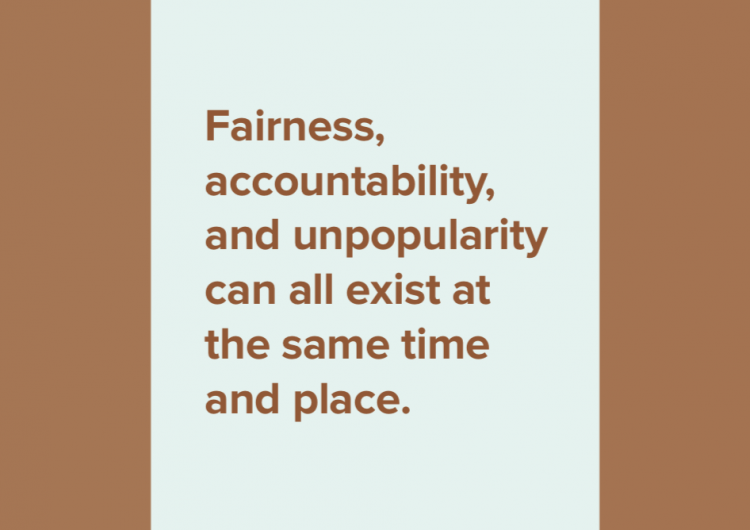Boards of directors want to know that co-op staff are fairly treated and that the co-op has a good reputation as an employer. General managers need the authority to carry out board policy, and that authority includes holding staff accountable for performance and making decisions that may not be popular with all staff. These goals are not mutually exclusive. Fairness, accountability, and unpopularity can all exist at the same time and place.
Few factors can more rapidly undermine trust between a board and a manager than communications between board members and employees bringing complaints about the general manager (GM). Many co-ops have adopted a staff treatment policy mandating written personnel policies that, among other things, provide for “fair and thorough handling of grievances.” Yet sometimes staff sidestep the established procedure and go directly to the board.
Employee concerns that bubble up to the board fall into three “buckets”: grievances about a GM decision, allegations of GM misconduct, or dissatisfaction with a GM’s leadership. If you can determine which bucket a complaint falls into, the next steps may not be easy, but they will be more clear.
1. Specific management decisions that one or more employees believe unfair:
Such decisions include disciplinary actions, evaluation results, pay raises, promotions, work schedules, time off, or any claim of failure to follow, or unfair application of, personnel policies.
These complaints should be addressed by a grievance or conflict resolution procedure. If your staff is represented by a union, the contract will contain provisions for grievances that involve union representatives at each step. The grievance goes up the chain of command. If unresolved at lower levels, it comes to the general manager. If the grievance is not resolved between the GM and union, the contract may call for outside arbitration.
For co-ops where employees are not represented by a union, or for employees outside the bargaining unit, the personnel policies should spell out the steps to follow. Like union grievances, these procedures also go up the chain of command. They may also involve the human resources manager. But in the end, the GM has the final say.
In past editions of Cooperative Grocer I proposed setting up a committee of management and non-management staff to decide on grievances. But attorneys working with co-ops have advised against giving non-supervisors the ability to overturn a decision of management, which would allow individuals without legal accountability the ability to assume legal risk for the organization. Such arrangements may also violate the National Labor Relations Act.¹
Based on anecdotal evidence, I’d say most workplace conflicts that staff bring to a formal procedure are about disciplinary actions, including terminations. If employees come to the board protesting their own or another’s disciplinary action, the board should refer them to the established conflict resolution procedure as the available channel. No matter how compelling the story, the board needs to stay out of the GM’s decision and trust in the procedure that the board previously accepted as being in compliance with its staff treatment policies.
2. Allegations of general manager misconduct:
Some situations are not appropriate for a conflict resolution procedure, however. If employees believe a coworker or manager has committed unethical and/or illegal acts, they should have recourse to a process for reporting it to those with the authority to address the problem. Examples of misconduct include but are not limited to:
- Sexual harassment or other forms of unlawful harassment or discrimination
- Use of co-op resources, funds, or property for personal gain
- Mishandling of co-op resources resulting in serious losses for the co-op
- Withholding substantive information from, or giving false information to, the board of directors
- Nepotism, i.e., showing favoritism in decisions based on family relationship or friendship
- Engaging in or permitting sale, solicitation, or use of controlled substances at work
A whistleblower policy in the personnel policy manual should define misconduct, provide a reporting protocol, and prohibit retaliation. As part of monitoring for staff treatment, boards should assure themselves that a mechanism like this exists for staff to use in cases of misconduct. ²
What if the manager accused of misconduct is the GM? Or what if employees bring a claim of misconduct to management and yet the misconduct continues? This is where the board has a role as supervisor of the GM. If employees bring misconduct claims to the board under a whistleblower policy, the board must take steps to discover the facts of the case through a rigorous and professional process. Unless the facts can be determined quickly and easily, board members should not conduct the investigation themselves. For complex situations with competing claims and/or legal implications, it is better to hire an experienced third-party investigator.
The word “investigation” can be inflammatory. If it becomes public knowledge that the GM is “under investigation,” the GM’s authority could be undermined. Perhaps the term “fact-finding” could be used instead. Regardless of what you call it, what is needed is a systematic examination of the facts. Once the board receives the results, it will have to use its best judgment to decide how to act.
Should the board place the GM on leave pending the results of an investigation? That depends on the circumstances, especially the severity of the claim. A board at a co-op whose GM was accused of sexual assault put the GM on leave while doing fact-finding. At another co-op, the GM went on working while an investigator followed up claims of serious health department violations permitted by the GM and alcohol consumption in his office. The former case ended in the GM’s termination. The latter case resulted in clearing the GM of all accusations.
While it’s not necessary or desirable to provide all the details, it would be thoughtful and proactive to inform the employee(s) who brought the misconduct claim that an investigation was conducted and that the board took action based on its results—or not, if the results were inconclusive.
Both whistleblower and conflict resolution policies should contain prohibitions on retaliation for using the policies and a channel for reporting retaliation if it occurs. But let’s define it first. Retaliation is an adverse action (e.g., termination, discipline, refusal to hire or promote, cutting hours) by an employer against an employee who exercised their rights under the policy. Retaliation is not a display of discomfort or awkwardness on the part of either employee or manager after an employee has exercised their rights.
As Justice Breyer wrote for the Supreme Court on the landmark harassment case, Burlington Northern & Santa Fe Railroad v. White:
We speak of material adversity because we believe it is important to separate significant from trivial harms… An employee’s decision to report discriminatory behavior cannot immunize that employee from those petty slights or minor annoyances that often take place at work and that all employees experience…
Once an employee has either filed a grievance or reported GM misconduct to the board, the GM should not take any adverse action against the employee that might appear retaliatory without first consulting legal counsel.
3. General complaints about the general manager’s leadership or communications style:
When employees complain to a board about the GM’s style or general approach, such complaints are not about specific management decisions that could be referred to the conflict resolution procedure. Nor are they accusations of unethical behavior. Instead, these employees may say the GM is “the wrong fit,” or “a poor communicator,” or “too corporate,” or “taking the co-op in the wrong direction,” or “creating a climate of fear.”
In such cases, the only way to resolve their issues is for the employees to address the GM directly. If the board, in an attempt to speak for the concerned employees, passes on nebulous accusations to the GM without being able to provide actionable specifics, the GM can’t effectively respond and improve working relationships. Moreover, without an objective survey of the whole staff, the board can’t be sure that the employees with the complaints are representative of staff opinion.
What the board can do is establish a framework in which the employees can feel safe bringing their concerns to the GM. First, the board can assure the employees that it will uphold a strict prohibition on retaliation, requesting them to return to the board if they perceive they are the target of retaliatory action. (In the event of claims of retaliation, the board should hire an investigator to find the facts.)
Next, the board should hold the GM accountable by requesting regular progress reports in the meeting packet, with opportunity to discuss at board meetings. Unless there are individual staff performance issues involved, these discussions don’t have to be in executive session. In this way, the staff bringing the complaints to the board can be assured that nothing is being swept under the rug, while they still have to talk directly to the GM to address their dissatisfaction.
Additionally, regular employee surveys with at least 95 percent participation provide important context for boards when evaluating the claims that fall in this third bucket of dissatisfaction with GM leadership.
Some advice for general managers
Feeling defensive in such situation would be understandable. Nevertheless, this is a time to deploy your emotional intelligence and demonstrate leadership. If you want your staff in the future to come to you directly and talk openly about their disagreements and concerns, instead of going to third parties such as the board, you need to make yourself a welcoming audience and thank them for their candor.
As a first step, arrange listening sessions with individuals or small groups. In these initial meetings, just listen and ask questions in order to understand. Avoid arguing and defending. Maintain an attitude of curiosity. Take notes as you listen.
Once you have some understanding of the issues underlying the complaints, set up a task force, or several, to develop options for resolving specific concerns. You can invite other staff to participate, not just those who initially went to the board. Report regularly to the staff as well as the board on issues raised and steps taken toward resolving them. Don’t hide out in your office. Make a point of being visible on the floor at strategic times. And if you’re feeling unfairly put upon, draw on outside parties (consultants, NCG staff, other co-op GMs) who can help you see things in a neutral light.
Multiple buckets
Sometimes a board receives a mixed bag of complaints that fall into two or all three buckets. For example, one co-op GM was accused of:
- unfairly denying vacation requests during an expansion;
- withholding information from the board on the expansion running over budget;
- acting cold, abrupt, and unsupportive to her direct reports.
For the first complaint, the board told the employees to use the conflict resolution procedure. For the second complaint, as a claim covered by the whistleblower policy, the board investigated the facts, also consulting with an outside party for understanding of the appropriate information it should be receiving. For the third complaint, the board instructed the GM to meet with her managers, and report back to the board on her progress in improving that working relationship.
Sorting the different claims into their respective buckets will help prevent confusion and result in fairer outcomes.
¹ Here’s a model conflict resolution policy for a non-union workplace or for employees outside a bargaining unit. Workplace Conflict Policy
² Here’s a model whistleblower policy for use in employee handbooks. Whistleblower Policy for Employee Handbook
Have more questions?
Get in touch with one of our consultants.



